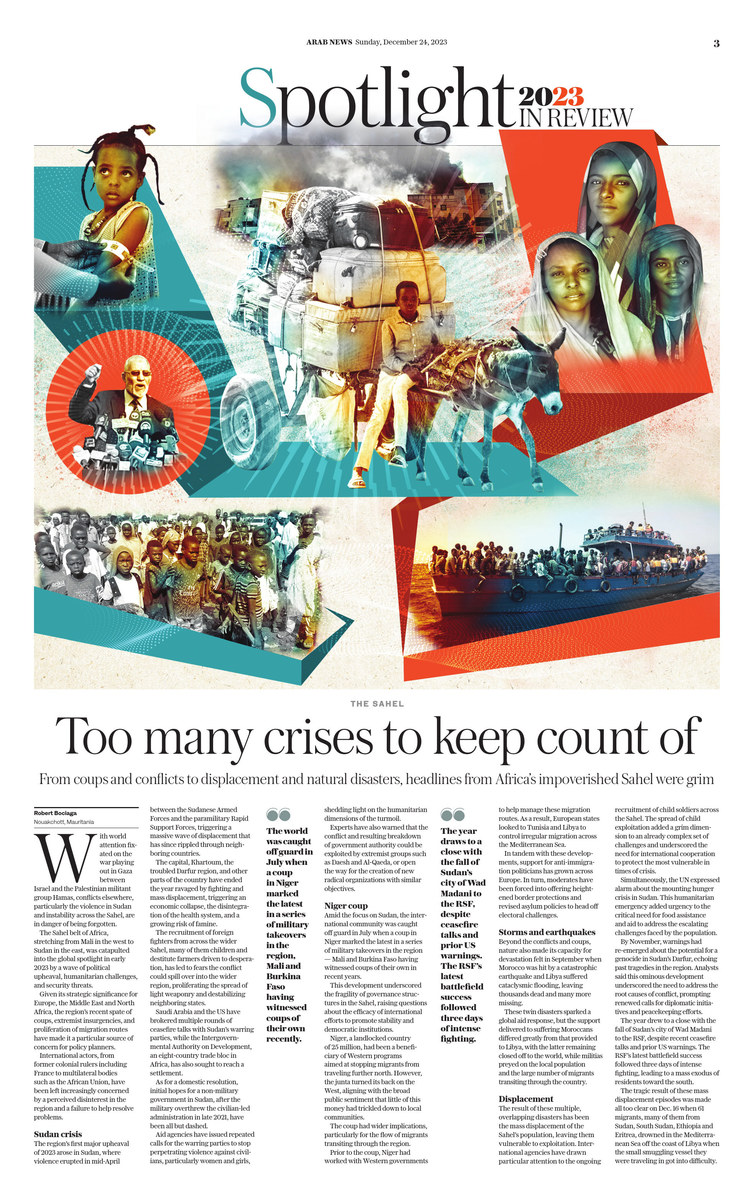NOUAKCHOTT, Mauritania: With world attention riveted on the war raging in Gaza between Israel and the Palestinian militant group Hamas, conflicts elsewhere, particularly the violence in Sudan and instability across the Sahel, are in danger of being forgotten.
The Sahel belt of Africa, stretching from Mali in the west to Sudan in the east, was catapulted into the global spotlight in early 2023 by a wave of political upheaval, humanitarian challenges, and security threats.
Given its strategic significance for Europe, the Middle East and North Africa, the region’s recent spate of coups, extremist insurgencies, and proliferation of migration routes have made it a particular source of concern for policy planners.
International actors, from former colonial rulers including France to multilateral bodies such as the African Union, have been left increasingly concerned by a perceived disinterest in the region and a failure to help resolve problems.
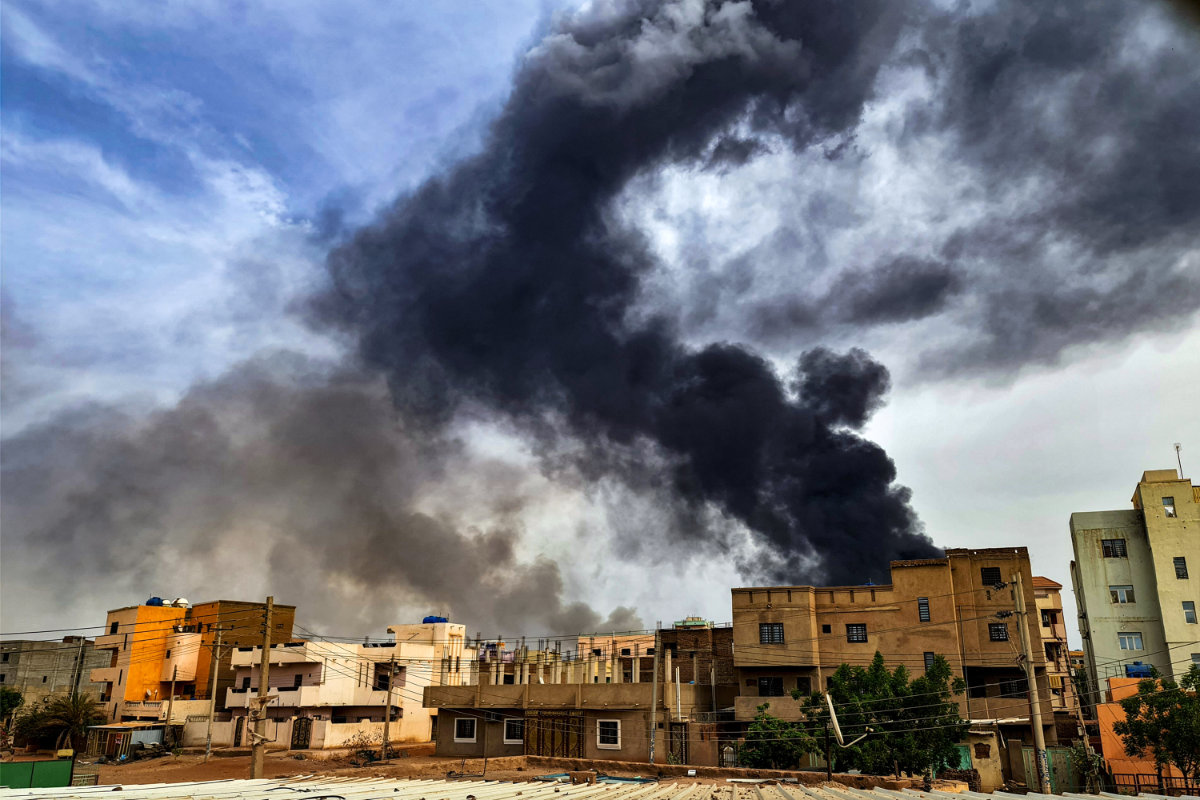
In April 2023, fighting between Sudan's army and the paramilitary forces of Mohammed Dagalo broke out, sending tens of thousands of people fleeing their homes. (AFP)
Sudan crisis
The region’s first major upheaval of 2023 arose in Sudan, where violence erupted in mid-April between the Sudanese Armed Forces and the paramilitary Rapid Support Forces, triggering a massive wave of displacement that has since rippled through neighboring countries.
The capital, Khartoum, the troubled Darfur region, and other parts of the country have ended the year ravaged by fighting and mass displacement, triggering an economic collapse, the disintegration of the health system, and a growing risk of famine.
The recruitment of foreign fighters from across the wider Sahel, many of them children and destitute farmers driven to desperation, has led to fears the conflict could spill over into the wider region, proliferating the spread of light weaponry and destabilizing neighboring states.
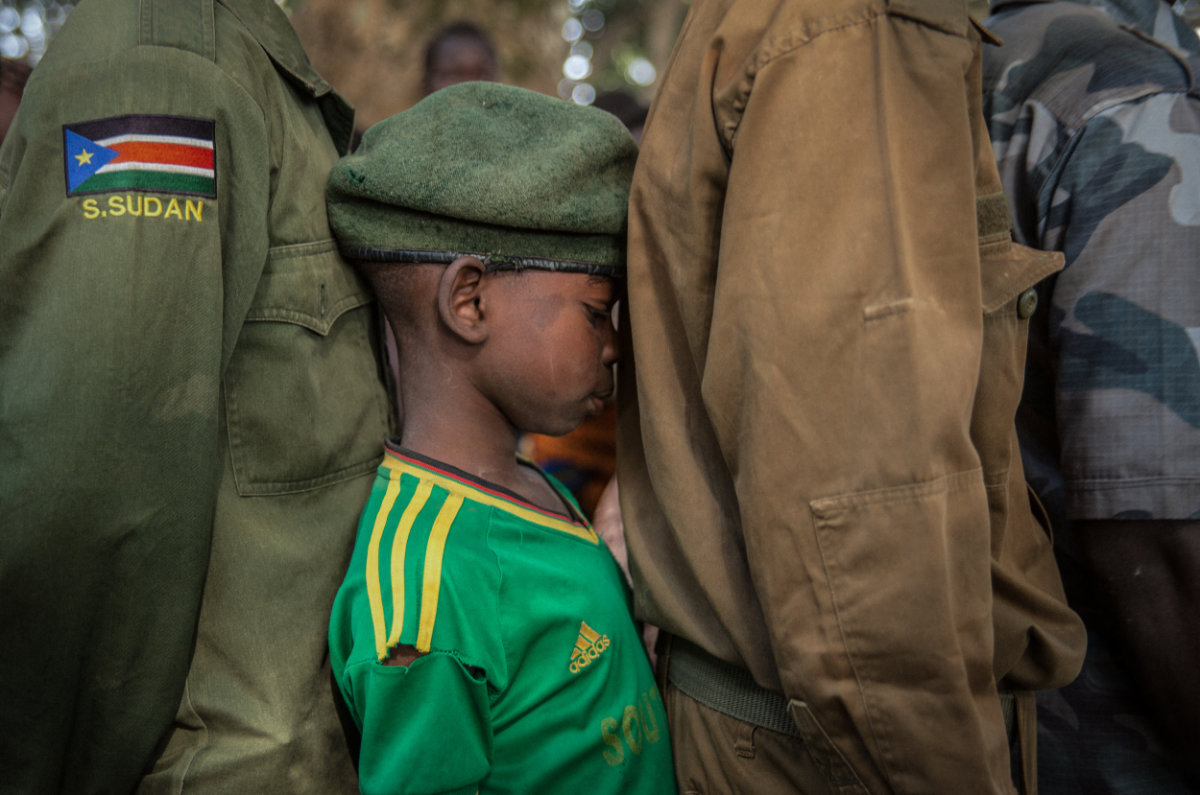
The conflict in Sudan has revived fears about children being exploited by the warring sides to fight. (AFP/File)
Saudi Arabia and the US have brokered multiple rounds of ceasefire talks with Sudan’s warring parties, while the Intergovernmental Authority on Development, an eight-country trade bloc in Africa, has also sought to reach a settlement.
As for a domestic resolution, initial hopes for a non-military government in Sudan, after the military overthrew the civilian-led administration in late 2021, have been all but dashed.
Aid agencies have issued repeated calls for the warring parties to stop perpetrating violence against civilians, particularly women and girls, shedding light on the humanitarian dimensions of the turmoil.
Experts have also warned that the conflict and resulting breakdown of government authority could be exploited by extremist groups such as Daesh and Al-Qaeda, or open the way for the creation of new radical organizations with similar objectives.
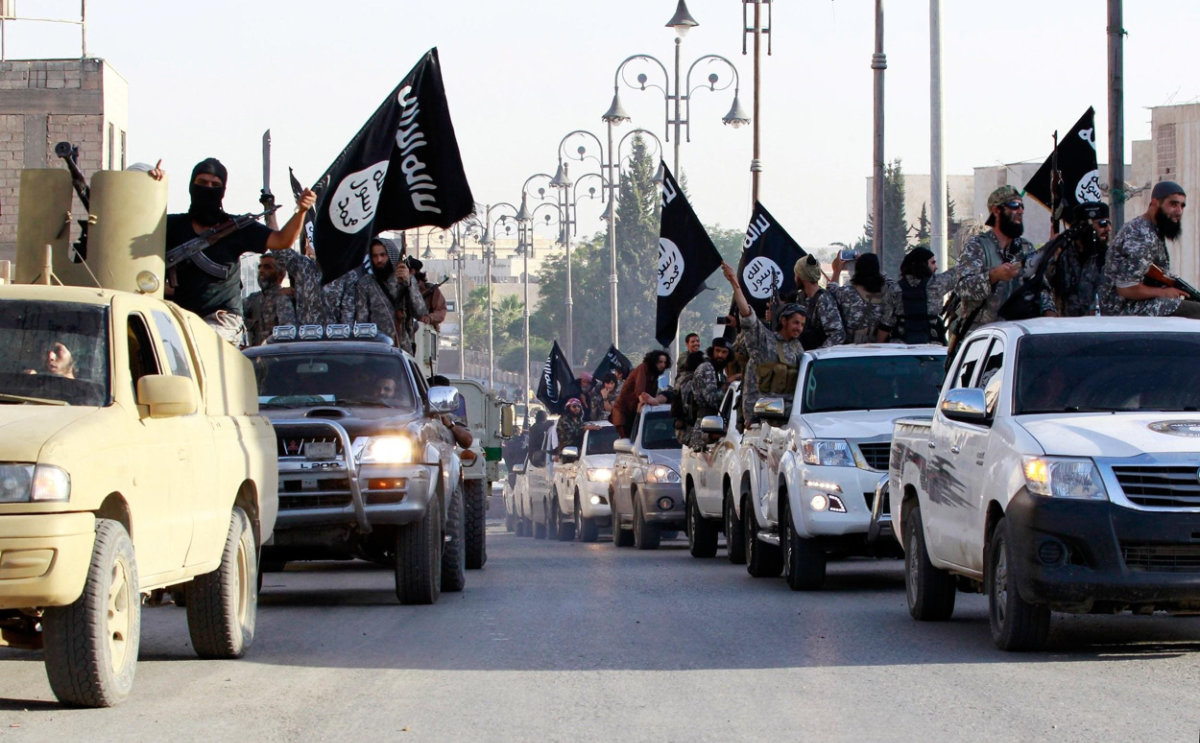
Experts have warned that the conflict and resulting breakdown of government authority could be exploited by extremist groups such as Daesh and Al-Qaeda to pursue their goals. (AFP/File)
Niger coup
Amid the focus on Sudan, the international community was caught off guard in July when a coup in Niger marked the latest in a series of military takeovers in the region — Mali and Burkina Faso having witnessed coups of their own in recent years.
This development underscored the fragility of governance structures in the Sahel, raising questions about the efficacy of international efforts to promote stability and democratic institutions.
Niger, a landlocked country of 25 million, had been a beneficiary of Western programs aimed at stopping migrants from traveling further north. However, the junta turned its back on the West, aligning with the broad public sentiment that little of this money had trickled down to local communities.

Niger's National Council for Safeguard of the Homeland (CNSP) seized power in the West African nation in July 2023, aggravating the political crisis in the region. (AFP)
The coup had wider implications, particularly for the flow of migrants transiting through the region.
Prior to the coup, Niger had worked with Western governments to help manage these migration routes. As a result, European states looked to Tunisia and Libya to control irregular migration across the Mediterranean Sea.
In tandem with these developments, support for anti-immigration politicians has grown across Europe. In turn, moderates have been forced into offering heightened border protections and revised asylum policies to head off electoral challenges.
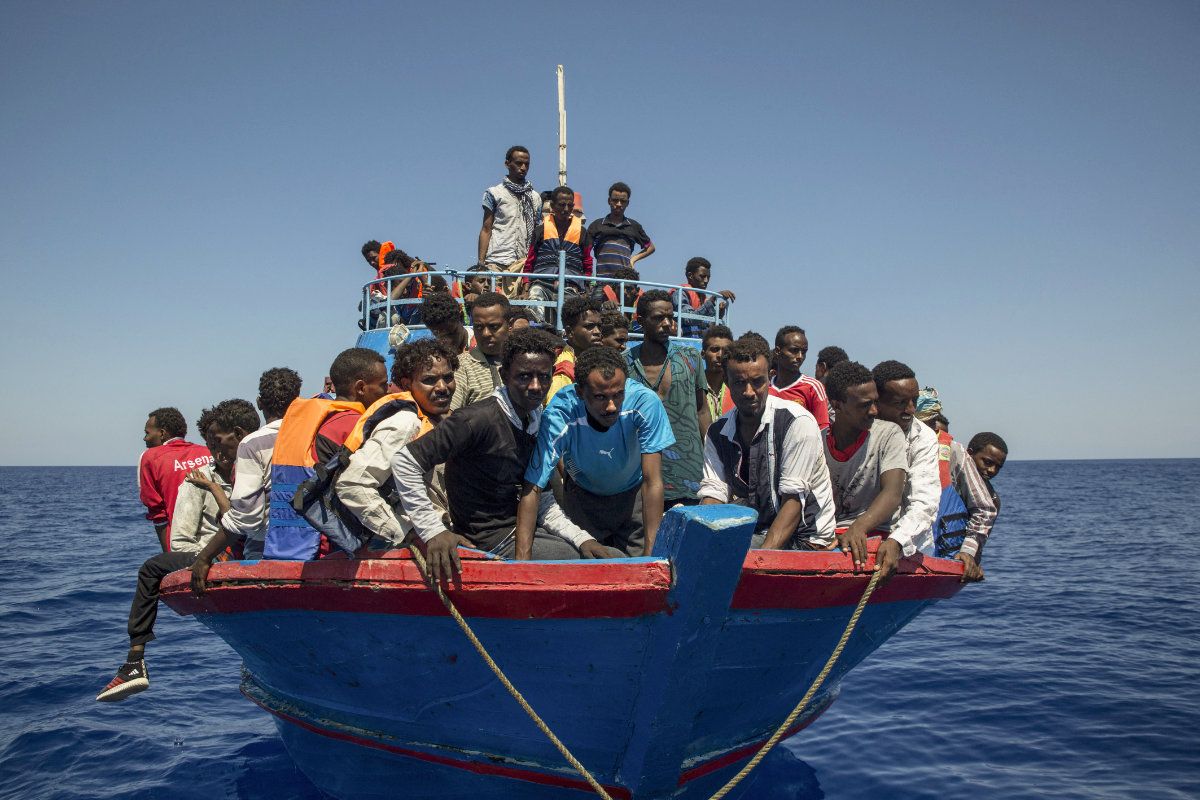
Migrants wait to be saved by the Aquarius rescue ship run by the "SOS Mediterranee" and "Medecins Sans Frontieres" (Doctors Without Borders) off Libya in the Mediterranean Sea on August 2, 2017. (AFP)
Storms and earthquakes
Beyond the conflicts and coups, nature also made its capacity for devastation felt in September when Morocco was hit by a catastrophic earthquake and Libya suffered cataclysmic flooding, leaving thousands dead and many more missing.
These twin disasters sparked a global aid response, but the support delivered to suffering Moroccans differed greatly from that provided to Libya, with the latter remaining closed off to the world, while militias preyed on the local population and the large number of migrants transiting through the country.
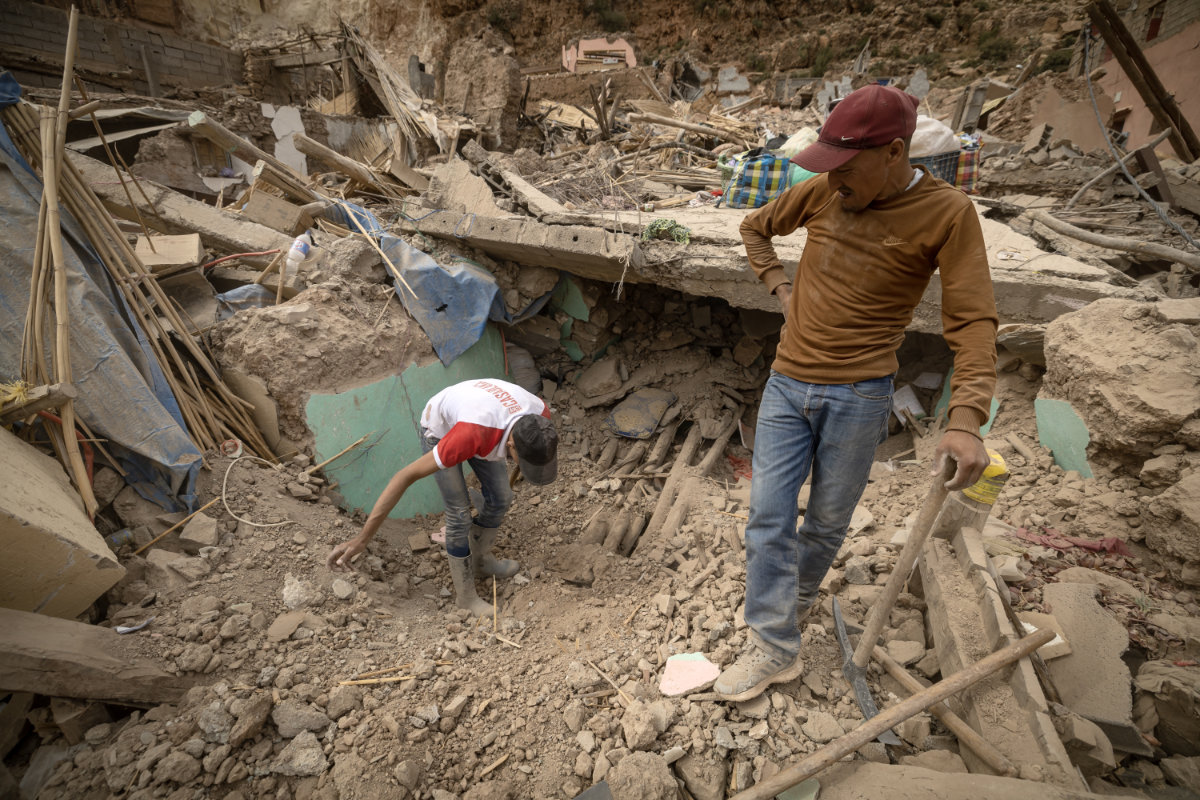
A man searches through the rubble in the earthquake-hit village of Imi N’Tala, in central Morocco on October 5, 2023. (AFP/File)
Displacement
The result of these multiple, overlapping disasters has been the mass displacement of the Sahel’s population, leaving them vulnerable to exploitation. International agencies have drawn particular attention to the ongoing recruitment of child soldiers across the Sahel.
The spread of child exploitation added a grim dimension to an already complex set of challenges and underscored the need for international cooperation to protect the most vulnerable in times of crisis.
Simultaneously, the UN expressed alarm about the mounting hunger crisis in Sudan. This humanitarian emergency added urgency to the critical need for food assistance and aid to address the escalating challenges faced by the population.
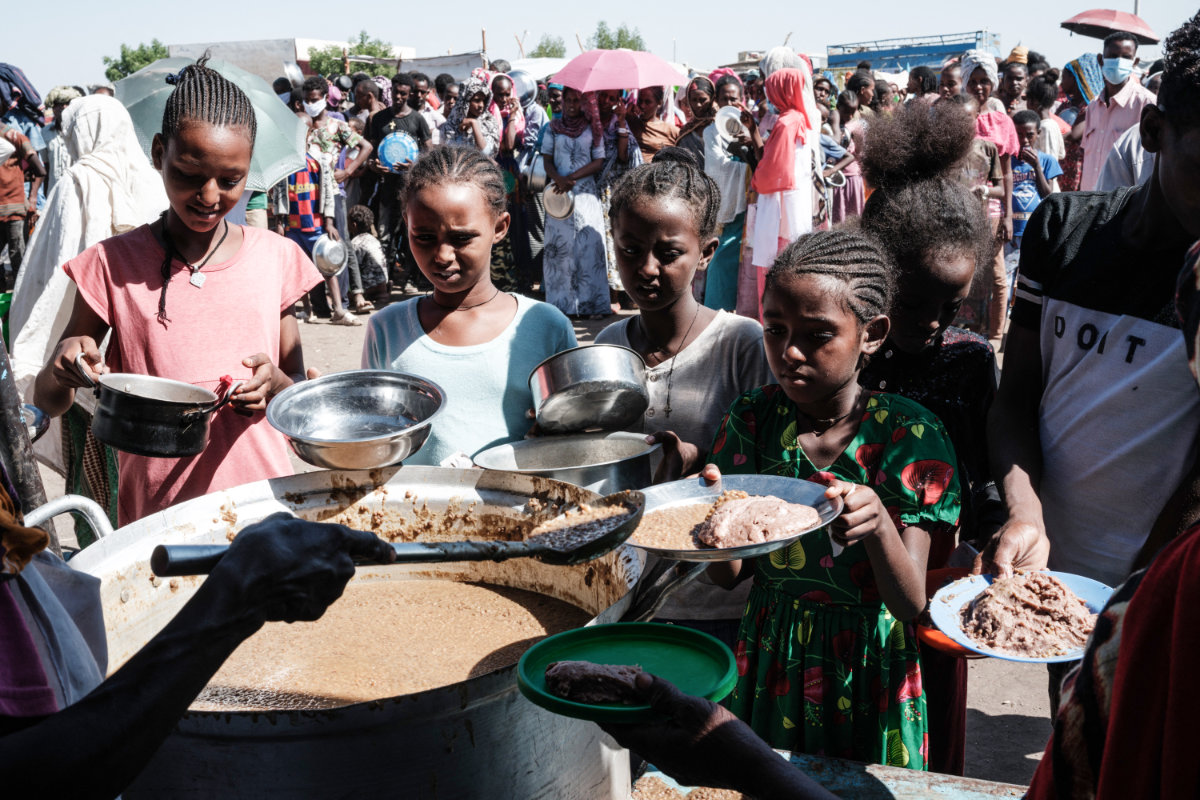
Children queue for food at a refugee center for people displaced by the war in Sudan, in tis July 2023 photo. (AFP/File)
By November, warnings had reemerged about the potential for a genocide in Sudan’s Darfur, echoing past tragedies in the region. Analysts said this ominous development underscored the need to address the root causes of conflict, prompting renewed calls for diplomatic initiatives and peacekeeping efforts.
The year drew to a close with the fall of Sudan’s city of Wad Madani to the RSF, despite recent ceasefire talks and prior US warnings. The RSF’s latest battlefield success followed three days of intense fighting, leading to a mass exodus of residents toward the south and the suspension of operations by aid organizations.
The tragic result of these mass displacement episodes was made all too clear on Dec. 16 when 61 migrants, many of them from Sudan, South Sudan, Ethiopia and Eritrea, drowned in the Mediterranean Sea off the coast of Libya when the small smuggling vessel they were traveling in got into difficulty.
Signs of hope
Perhaps the only positive news emanating from the region in the closing days of 2023 was the US helping to foster reconciliation between Algeria and Morocco in addressing the Western Sahara conflict.

UN's Western Sahara envoy Staffan de Mistura (L) shakes hands with Polisario leader Brahim Ghali (R) in Algeria's southwestern city of Tindouf. (AFP/File)
A persistent source of contention between the two Arab neighbors, the disputed nature of the territory also bears significance for external actors owing to its role as a transit point for Africans migrating toward Spain.
If one lesson can be drawn from the past 12 months, analysts believe it is the need for comprehensive solutions, addressing both the root causes of the many overlapping conflicts in the Sahel and their broader impact on migration patterns.
